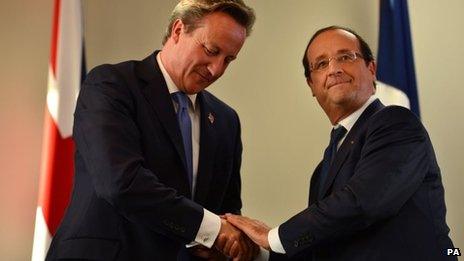Britain and France 'at odds with one another, again'
- Published

Francois Hollande has accused David Cameron of being "a little phoney"
It has not been news for several centuries to report that Britain and France are often at odds with one another and that tension hangs across la Manche like a stubborn mist on the sea's face.
But of late the relationship has been pretty dire.
Tory ministers openly mock Francois Hollande's high tax economic policies and mull using his image in anti-Labour election posters. The Tory chairman Grant Shapps says France's economy has been "run into the sand".
Mr Hollande himself has accused David Cameron of being "a little phoney" over a claim at a summit that the European Union might be looking to develop its own military drone.
The French president's diplomats publicly dismiss the NHS as "ailing" and boast how many more hospital beds there are in France.
So when British officials insist that the "entente is tres cordial", one must take it with a pinch of salt. Of course, both countries still do the business.
PM 'needs allies'
At today's summit in Oxfordshire, both leaders will sign a flurry of deals so that their respective countries can cooperate more on defence, energy and space.
But the tricky issue of Europe will hang over the unlikely summit venue that is RAF Brize Norton. Mr Cameron's dilemma is this: he wants to reform the UK's relationship with the EU.
He hopes to use potential treaty changes following further Eurozone integration as an opportunity to negotiate his reforms.
But to do all that, the prime minister needs to persuade the rest of Europe. And he needs to do this before a planned referendum on Britain's membership in 2017.
And that means he needs allies. He cannot rely wholly on Chancellor Merkel of Germany. He has upset the Poles over immigration. So he needs French support too. But the French have made it clear they want his agenda like a hole in the head.
The French do not oppose the principle of reform and are all for a little simplification and tidying up. But they reject any kind of wholesale unpicking of the EU framework and yet more unilateral opt-outs.
They fear this could lead to Britain's exit and a much weaker EU. Mr Hollande is also loath to allow treaty changes that could force him into an unwinnable referendum and a row just ahead of his own elections in 2017.
So when the two leaders discuss all this in a pub in Oxfordshire today, the stakes will be high. Mr Cameron will have to find a way of winning some support from the French without making compromises that he could not sell to his party.
Today's meeting will not resolve this dilemma, it will merely be yet another difficult conversation in a long negotiation that could last years.
But in the short term, the British hope is that a pint of ale, a little country air and a wet morning on a windy airbase might help melt away some of those cross channel mists.